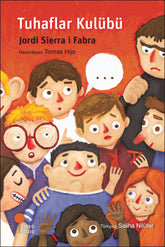IS CHILDREN'S LITERATURE ONLY FOR CHILDREN?
Children's literature has a history that has been ignored for many years. In fact, the first works written for children were also handbooks explaining the rules of etiquette. All the rules are listed item by item; "Do not play with your nose while eating, do not bite your nails!"
Even in the eighteenth century, writing for children was looked down upon as intellectually degrading. Fortunately, in the mid-nineteenth century, when paper became cheaper, literacy rates increased. Stories written for children were freed from that imperious, arrogant style to some extent. Thus, the bright era of children's books began. However, this time, children's books were expected to be primarily educational and secondarily entertaining. In fact, these stages also allow us to trace the cultural transformation in children's literature.
I remember the excitement I felt when I first read the 'Kumkurdu' series in my thirties, when I realized that I had the chance to look at life through a child's eyes again. In fact, it was an opportunity to repair the disappointment that the most popular books of my childhood had left in me.
The books I read with my son, Momo, Frederick, Good Hearted Giant Memo, Matilda, Yaman Tilki, Yazıan Cows, Küçük Kara Balik -and countless other children's books- offered the opportunity to return to that child's spirit to discover new things every day. Children's literature also reminded us of many things we had forgotten during adulthood; and suggested that we interpret events with the purest form of our hearts. Many things we lost as we grew up, many things we didn't remember and weren't even aware of... Don't we need children's books that feed our imagination, make us think and add hope at the same time, no matter how old we are?
Ursula Le Guin, one of the American children's book writers who describes that we live in a capitalist system and that it seems impossible to escape its power, says that resistance and change usually begin with art, that is, with the art of words. These sentences of Guin actually confirm the purpose of children's literature. For example, concepts in children's books are explained in their most natural and purest form. Even difficult subjects such as migration, death, justice and even the popular concept of recent years, 'bullying', reach the reader with strong and simple narratives through illustrated children's books. Children's books that appeal to all ages with a high sense of humor, far from lecturing and lecturing, achieve this. Intelligently handled subjects turn into a visual feast with playful illustrations.
In a sense, children's literature is actually an opportunity for adults to confront, remember, and reinterpret life and concepts. Doesn't this open a window from today to our childhood? Don't we always need those strong voices that make us who we are; happiness, joy, questioning, and hope? It's a good thing that there are children's books that give us courage and shed light on even our sadness, and instill dreams in us as we are on the path that determines brand new routes in our minds.
The story of those who are devoted to children's books begins with a small step, and as they dive deeper, it turns into a passion.
Tugba M. Alperen





